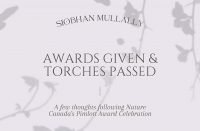“Worms are the heroes of existence.” This is what Alejandro Rojas said as we stood amid the raised beds of Eastdale Collegiate Institute’s 16,000 square foot rooftop garden in Toronto. He was here on a visit from Vancouver to meet with some key actors in food education, FoodShare among them, and to discuss how the two cities could continue to work together to develop their respective projects.
“Worms are the heroes of existence.” This is what Alejandro Rojas said as we stood amid the raised beds of Eastdale Collegiate Institute’s 16,000 square foot rooftop garden in Toronto. He was here on a visit from Vancouver to meet with some key actors in food education, FoodShare among them, and to discuss how the two cities could continue to work together to develop their respective projects. We were discussing the importance of teaching the whole cycle of food in schools, not just from field to table, but to the compost that goes back into the soil as well. It’s one of the key tenets of the Think & Eat Green @ School Project in Vancouver.
Rojas launched Think & Eat Green @ School four years ago through the University of British Columbia (UBC). The project aims to change the way students eat at school and how they learn about food and the environment, and to promote human and environmental health and food system sustainability. So far it has been a great success, involving teachers, students, parents, community gardeners, urban agriculturalists, chefs, restaurateurs, and community organizations, such as the Environmental Youth Alliance and the Public Heath Association of British Columbia. Over 300 UBC graduate and undergraduate students have worked with 44 schools in the Vancouver School Board (VSB) every year to develop a number of projects and programs.
Think & Eat Green is housed in UBC’s Faculty of Land and Food Systems, and more specifically in a number of courses that provide the opportunity for students to apply theoretical knowledge through hands-on learning in the community. The course “Land, Food and Community,” for instance, involves three visits to partner schools between September and December working on a number of projects such as vermicomposting, planting garlic, building cold frames, crop rotation planning and assessing and developing a Vancouver school’s organic waste management strategy. Other courses include “Nutrition Education in the Community” and “Sustainable Soil Management,” as well as a community-based field experience.
If the learning process approximates the complexities and the uncertainty of life, then learning will have very profound implications.
– Alejandro Rojas
Getting university students out the classroom was of the utmost importance for Rojas, motivated by his own experiences as a university student in his home country of Chile where he organized the mobilization of thousands of students to work with peasant farmers every summer for four years. The purpose, in addition to working with peasants in the fields, was to teach the peasant farmers to read and write, but Rojas found students learned as much, if not more, from the experience as those they were teaching.
This experience forms the basis of a philosophy he calls “learning with life” and explained to me that, “If the learning process approximates the complexities and the uncertainty of life, then learning will have very profound implications.” This philosophy shapes the project’s model of moving from inquiry to engagement. In this way the research and programs are shaped by collaborative engagement between the university researchers and the community actors, rather than by the university alone. They feed into each other, creating a cycle of learning, just like the food that cycles from field to table and back to the earth.
Professional development is another key component of the project, ensuring that teachers are equipped for integrating food education into their classrooms and curriculum. Workshops and seminars are held on professional development days (Pro-D Days) at VSB schools and during after school specials. They also host a Summer Institute every year that takes place over three days and consists of plenary sessions, workshops and hands-on experiential activities delivered by UBC professors and graduate students and community-based partners. They focus on components such as procurement, preparation and consumption of food at school; curriculum and pedagogical innovations; school food policies; and composting and waste management.
Every year the project also sets aside $20,000 to $30,000 of its Social Sciences and Humanities Research Council funding for small grants of up to $2,000 to support self-generated school projects, such as chicken coops, compost bin construction, gardening and food prep workshops and school staff capacity-building workshops. The project also supports the development of policies that will enable healthier, more sustainable school systems and they have a number of tools in place, like the School Food Environment Assessment Tool, and various qualitative research tools for data collection, research and analysis and to guide the project’s actions.
No one entity, whether it be the university or a community organization, has an easy solution to the problem of food security.
Ultimately, the project is an experiment in social learning and community-based action research. At its core is a spirit of collaboration—collaborative learning, collaborative teaching and collaborative research. They’ve taken an integrative approach, rather than dividing along disciplinary lines, in order to move beyond the traditional lines of expertise.
There’s a very good reason for this. No one entity, whether it be the university or a community organization, has an easy solution to the problem of food security and sustainability. It’s one that needs to be approached by a community of people learning from each other, and the Think & Green @ School Project demonstrates how a collaborative effort can address problems of a global scope by promoting change at the local level.
Genevieve is earning her master’s degree in Environmental Studies at York University with a focus on sustainable food systems, food education and food literature. In The Mouthful, she blogs about the environmental politics and possibilities of food. Genevieve is a certified pastry chef and aspiring novelist. She lives in Toronto. @GFullan












